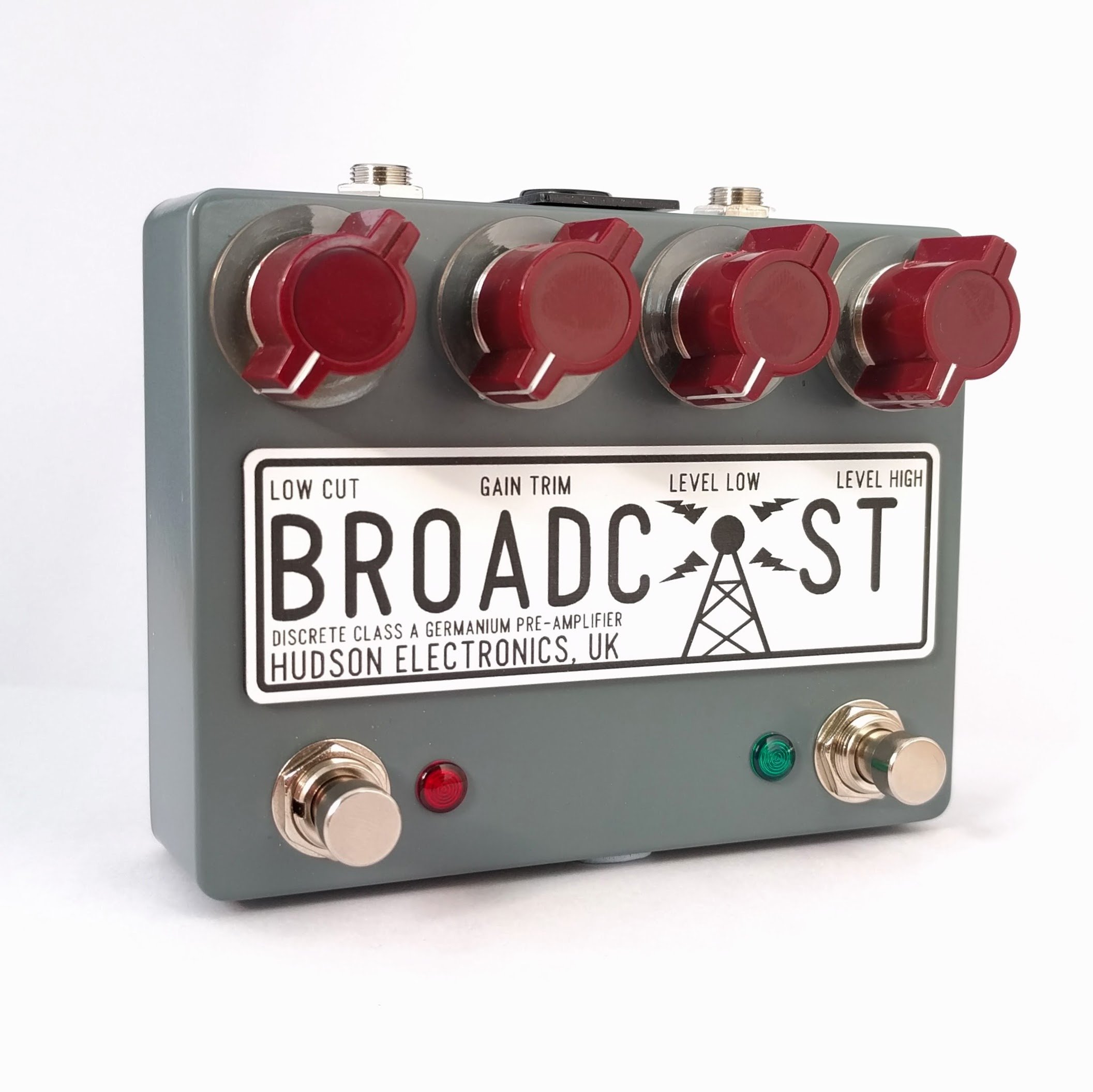Review : Hudson Broadcast
“Wait” you may say. “Another Overdrive Pedal!”. “Who needs that?” Perhaps you do. Hi my name is Ross and I am a pedal dork. I own more pedals than is logical and find it difficult not to buy more. This one I got almost a year ago. I tried it and it worked so well it went on my Victory Viscount board and stayed there and is used so regularly, I don’t really think about it.
When a pedal is that well integrated and fits so nicely, sometimes we miss how great that is.
What is the Hudson Broadcast?
My version of the Broadcast is a two switch version of the device from Hudson Electronics in the UK. Its design looks old, like it comes from the recording studios of the sixties which is by intent because it is a discrete germanium transformer coupled preamp as was used in broadcasting in that decade. It provides two unique channels of gain, low and high, a shared gain level and a control over the amount of low end attenuation.
I find this very handy when dealing with very different pickups. With single coils that are not bass rich, I can reduce the amount of low cut. For bass heavy pickups like hot humbuckers, I can increase the amount of low cut to prevent the creation of muddy sound.
The left switch is the bypass or on / off switch. The right switch controls whether you are in low gain or high gain mode, with the LED lighting green when you are in high gain mode. If the LED is off, you are in low gain mode. Each gain option has its own level control so you can set the output levels according to your desired tone. The low cut knob controls the amount of low frequency attenuation.
Gain Trim is where the magic happens. Rolled off, the level controls determine how much clean boost that you get. It is what you expect from a clean boost, delivering a uniform boost across the frequency range so long as you have the Low Cut dialled off. Turning up the Gain Trim starts to push the transistor and transformer into producing overdrive and then you can choose the low gain or high gain mode via the right foot switch and control the levels separately.
Some boosts can get a bit on the nose, or push tones that are unpleasant. The Hudson Broadcast does not do that. In clean boost mode, it’s very pleasing. When the Gain Trim is turned up, you get a nice analog overdrive tone without a mid hump or mid trough. It’s not a Tube Screamer for example. The knobs are large enough to tweak and the standard colour unit pictured is easy to see in stage lighting. My unit is a special edition with a gold plate and a black finish which looks great in the light but is rather impractical in stage lighting until you memorize the simple control layout.
Hudson has a link to an independent review on their site which is well done, but I do not think shows the pedal to its best with an awful lot of fizzy stuff that I don’t care for. Consequently I recorded this very short sample.
Clean Boost / High Gain Sample
To make this brief recording, I had the Hudson Broadcast in its usual position on the board for the Victory Viscount amplifier. That amp runs into a Two Notes Torpedo Capture X which is running a profile of a black face Fender Princeton amplifier with a 1x12 cabinet. There is an SM57 on axis and close in and a Beyerdynamic 160 on axis but moved away from the amplifier to gather room ambience. The signal from the Captor X runs into the L and R inputs on an Apollo Twin X using an SSL E channel strip in the Unison preamp position. The Apollo went into Logic Pro X where on the output I placed an 1176LN E compressor set to my preferred option for electric guitar and then added a UA Pure Plate reverb set mostly dry just for a bit of space. No EQ was used on the amp, the Torpedo or in Logic. You are hearing what I was hearing in my headphones while I recorded.
Since people ask, the guitar used was my 1954 Les Paul Custom Black Beauty Reissue. For a Les Paul it is incredibly lightweight and while I used the middle pickup selector position, it has a really wonderful P90 in the bridge and the unparalleled staple P90 in the neck. A wonderful guitar and always a joy to play.
Settings on the Broadcast had the Gain Trim set very low, so I got a nice clean boost but at unity gain to the guitar signal. I tend to favour an always on boost to open things up a bit and the Hudson Broadcast does a very nice job at this. I had the low gain volume set to give me unity so it matched the level when the Broadcast was bypassed. I did not change the Gain Trim at all for the High Gain option, I just adjusted the volume to try to get it as close to the bypassed level as I could. After recording, I realized that I did not get it quite right and so had to drop the level faders on tracks 3 and 4 (where the high gain sounds were recorded) a bit in order to make them output level equivalent to the clean sounds on tracks 1 and 2. As this is a very short sample, be assured that there is a lot of versatility in the gain settings depending on the placement of the Gain Trim control. I was not trying to demonstrate all the potential tones of the Hudson Broadcast.
Placement of the pedal matters. Currently the boost is always on, and comes after a JAM Rooster, Wampler Velvet and Diamond J-Drive. All are great pedals, I just prefer opening them up a bit with the clean boost at unity gain afterwards. I have a Wampler Tumnus after the Hudson Broadcast and that opened boost signal makes a nice difference to the already superb tone of the Tumnus. I would encourage experimentation with gain pedal stacking and pedal order to find what works optimally for you.
Conclusions
I am very pleased with the investment that I made in the Hudson Broadcast. As readers know, I get no stuff free and am not a paid influencer, so you get the unvarnished perspectives. The Hudson Broadcast has a unique tonality resulting from the design imperatives. I own other boost pedals, tube based and analog options. They are not all the same, which is wonderful and I would say that the Hudson isn’t like any of the others. It’s its own thing and that makes it highly recommended because it does such an awesome job.
Thanks for reading. If you have any questions please submit them here. Until next time, peace.

